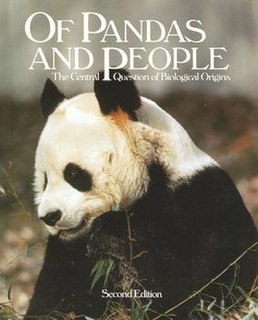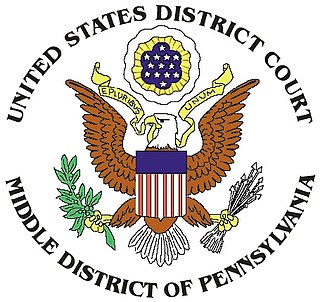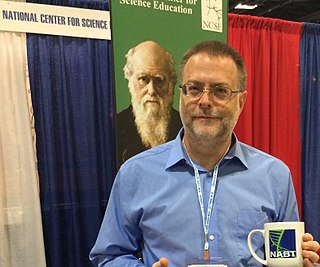
The National Center for Science Education (NCSE) is a not-for-profit membership organization in the United States whose stated mission is to educate the press and the public on the scientific and educational aspects of controversies surrounding the teaching of evolution and climate change, and to provide information and resources to schools, parents, and other citizens working to keep those topics in public school science education. Based in Oakland, California, it claims 4,500 members that include scientists, teachers, clergy, and citizens of varied religious and political affiliations. The Center opposes the teaching of religious views in science classes in America's public schools; it does this through initiatives such as Project Steve. The Center has been called the United States' "leading anti-creationist organization". The Center is affiliated with the American Association for the Advancement of Science.

Eugenie Carol Scott is an American physical anthropologist, a former university professor and educator who has been active in opposing the teaching of young Earth creationism and intelligent design in schools. She coined the term "Gish gallop" to describe a fallacious rhetorical technique which consists in overwhelming an interlocutor with as many individually-weak arguments as possible, in order to prevent rebuttal of the whole argument.
Project Steve is a list of scientists with the given name Stephen or Steven or a variation thereof who "support evolution". It was originally created by the National Center for Science Education as a "tongue-in-cheek parody" of creationist attempts to collect a list of scientists who "doubt evolution", such as the Answers in Genesis's list of scientists who accept the biblical account of the Genesis creation narrative or the Discovery Institute's A Scientific Dissent From Darwinism. The list pokes fun at such endeavors while making it clear that, "We did not wish to mislead the public into thinking that scientific issues are decided by who has the longer list of scientists!" It also honors Stephen Jay Gould. The level of support for evolution among scientists is very high. A 2009 poll by Pew Research Center found that "Nearly all scientists (97%) say humans and other living things have evolved over time."

Stephen C. Meyer is an American author and former educator. He is an advocate of intelligent design, a pseudoscientific creationist argument for the existence of God, presented with the claim that it is "an evidence-based scientific theory". He helped found the Center for Science and Culture (CSC) of the Discovery Institute (DI), which is the main organization behind the intelligent design movement. Before joining the DI, Meyer was a professor at Whitworth College. Meyer is a Senior Fellow of the DI and Director of the CSC.

Theistic science, also referred to as theistic realism, is the pseudoscientific proposal that the central scientific method of requiring testability, known as methodological naturalism, should be replaced by a philosophy of science that allows occasional supernatural explanations which are inherently untestable. Proponents propose supernatural explanations for topics raised by their theology, in particular evolution.

Of Pandas and People: The Central Question of Biological Origins is a controversial 1989 school-level textbook written by Percival Davis and Dean H. Kenyon, edited by Charles Thaxton and published by the Texas-based Foundation for Thought and Ethics (FTE). The textbook endorses the pseudoscientific concept of intelligent design – the argument that life shows evidence of being designed by an intelligent agent which is not named specifically in the book, although proponents understand that it refers to the Christian God. The overview chapter was written by young Earth creationist Nancy Pearcey. They present various polemical arguments against the scientific theory of evolution. Before publication, early drafts used cognates of "creationist". After the Edwards v. Aguillard Supreme Court ruling that creationism is religion and not science, these were changed to refer to "intelligent design". The second edition published in 1993 included a contribution written by Michael Behe.

"Teach the Controversy" is a failed campaign, conducted by the Discovery Institute, to promote the pseudoscientific principle of intelligent design, a variant of traditional creationism, while attempting to discredit the teaching of evolution in United States public high school science courses. Scientific organizations, including the American Association for the Advancement of Science, note the institute to have manufactured a controversy, where there exists none.

Kitzmiller v. Dover Area School District, 400 F. Supp. 2d 707 was the first direct challenge brought in the United States federal courts testing a public school district policy that required the teaching of intelligent design, ultimately found by the court to not be science. In October 2004, the Dover Area School District of York County, Pennsylvania, changed its biology teaching curriculum to require that intelligent design be presented as an alternative to evolution theory, and that Of Pandas and People, a textbook advocating intelligent design, was to be used as a reference book. The prominence of this textbook during the trial was such that the case is sometimes referred to as the Dover Panda Trial, a name which recalls the popular name of the Scopes Monkey Trial in Tennessee, 80 years earlier. The plaintiffs successfully argued that intelligent design is a form of creationism, and that the school board policy violated the Establishment Clause of the First Amendment to the United States Constitution. The judge's decision sparked considerable response from both supporters and critics.
The Foundation for Thought and Ethics (FTE) was a Christian non-profit organization based in Richardson, Texas, which represented itself as a “Christian think tank”. It published textbooks and articles promoting pseudoscientific creation science and intelligent design, abstinence, and Christian nationalism. In addition, the foundation's officers and editors became some of the leading proponents of intelligent design. The FTE developed close associations with the Discovery Institute, hub of the intelligent design movement and other religious Christian groups. The FTE operated from 1981 to 2016. Foundation for Thought and Ethics Books is now listed as an imprint of Discovery Institute Press. From the outset its aim was to develop a "scientific critique" of evolution, which was published as The Mystery of Life's Origin in 1984, to be followed by "a two-model high school biology textbook".

Neo-creationism is a pseudoscientific movement which aims to restate creationism in terms more likely to be well received by the public, by policy makers, by educators and by the scientific community. It aims to re-frame the debate over the origins of life in non-religious terms and without appeals to scripture. This comes in response to the 1987 ruling by the United States Supreme Court in Edwards v. Aguillard that creationism is an inherently religious concept and that advocating it as correct or accurate in public-school curricula violates the Establishment Clause of the First Amendment.
The Sternberg peer review controversy concerns the conflict arising from the publication of an article supporting pseudoscientific intelligent design creationism in a scientific journal, and the subsequent questions of whether proper editorial procedures had been followed and whether it was properly peer reviewed.

The intelligent design movement has conducted an organized campaign largely in the United States that promotes a pseudoscientific, neo-creationist religious agenda calling for broad social, academic and political changes centering on intelligent design.

Brian J. Alters is a professor in Chapman University's College of Educational Studies. He directs Chapman's Evolution Education Research Center, has taught science education at both Harvard and McGill Universities, and is regarded as a specialist in evolution education.

"A Scientific Dissent from Darwinism" was a statement issued in 2001 by the Discovery Institute, a conservative think tank based in Seattle, Washington, U.S., best known for its promotion of the pseudoscientific principle of intelligent design. As part of the Discovery Institute's Teach the Controversy campaign, the statement expresses skepticism about the ability of random mutations and natural selection to account for the complexity of life, and encourages careful examination of the evidence for "Darwinism", a term intelligent design proponents use to refer to evolution.
Nicholas J. Matzke is the former Public Information Project Director at the National Center for Science Education (NCSE) and served an instrumental role in NCSE's preparation for the 2005 Kitzmiller v. Dover Area School District trial. One of his chief contributions was discovering drafts of Of Pandas and People which demonstrated that the term "intelligent design" was later substituted for "creationism". This became a key component of Barbara Forrest's testimony. After the trial he co-authored a commentary in Nature Immunology, was interviewed on Talk of the Nation, and was profiled in Seed magazine as one of nine "revolutionary minds".

Creationism's Trojan Horse: The Wedge of Intelligent Design is a 2004 book by Barbara Forrest and Paul R. Gross on the origins of intelligent design, specifically the Discovery Institute's Center for the Renewal of Science and Culture and its wedge strategy. The authors are highly critical of what they refer to as intelligent design creationism, and document the intelligent design movement's fundamentalist Christian origins and funding.

This timeline of intelligent design outlines the major events in the development of intelligent design as presented and promoted by the intelligent design movement.

Explore Evolution: The Arguments For and Against Neo-Darwinism is a controversial biology textbook written by a group of intelligent design supporters and published in 2007. Its promoters describe it as aimed at helping educators and students to discuss "the controversial aspects of evolutionary theory that are discussed openly in scientific books and journals but which are not widely reported in textbooks." As one of the Discovery Institute intelligent design campaigns to "teach the controversy" its evident purpose is to provide a "lawsuit-proof" way of attacking evolution and promoting pseudoscientific creationism without being explicit.

Glenn Branch is the deputy director of the National Center for Science Education. He is a prominent critic of creationism and intelligent design and an activist against campaigns of suppressing teaching of evolution and climate change in school education.
"Strengths and weaknesses of evolution" is a controversial phrase that has been proposed for public school science curricula. Those proposing the phrase, such as the chairman of the Texas State Board of Education (SBOE), Don McLeroy, purport that there are weaknesses in the theory of evolution and in the evidence that life has evolved that should be taught for a balanced treatment of the subject of evolution. The scientific community rejects that any substantive weaknesses exist in the scientific theory, or in the data that it explains, and views the examples that have been given in support of the phrasing as being without merit and long refuted.









